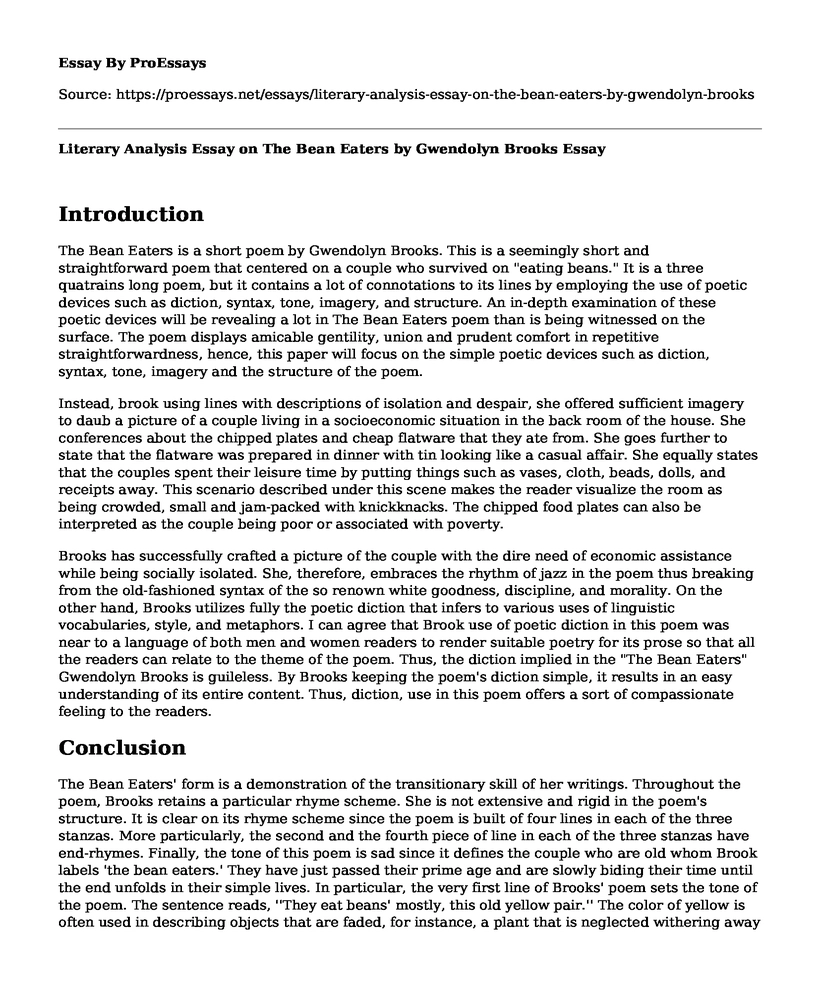Introduction
The Bean Eaters is a short poem by Gwendolyn Brooks. This is a seemingly short and straightforward poem that centered on a couple who survived on "eating beans." It is a three quatrains long poem, but it contains a lot of connotations to its lines by employing the use of poetic devices such as diction, syntax, tone, imagery, and structure. An in-depth examination of these poetic devices will be revealing a lot in The Bean Eaters poem than is being witnessed on the surface. The poem displays amicable gentility, union and prudent comfort in repetitive straightforwardness, hence, this paper will focus on the simple poetic devices such as diction, syntax, tone, imagery and the structure of the poem.
Instead, brook using lines with descriptions of isolation and despair, she offered sufficient imagery to daub a picture of a couple living in a socioeconomic situation in the back room of the house. She conferences about the chipped plates and cheap flatware that they ate from. She goes further to state that the flatware was prepared in dinner with tin looking like a casual affair. She equally states that the couples spent their leisure time by putting things such as vases, cloth, beads, dolls, and receipts away. This scenario described under this scene makes the reader visualize the room as being crowded, small and jam-packed with knickknacks. The chipped food plates can also be interpreted as the couple being poor or associated with poverty.
Brooks has successfully crafted a picture of the couple with the dire need of economic assistance while being socially isolated. She, therefore, embraces the rhythm of jazz in the poem thus breaking from the old-fashioned syntax of the so renown white goodness, discipline, and morality. On the other hand, Brooks utilizes fully the poetic diction that infers to various uses of linguistic vocabularies, style, and metaphors. I can agree that Brook use of poetic diction in this poem was near to a language of both men and women readers to render suitable poetry for its prose so that all the readers can relate to the theme of the poem. Thus, the diction implied in the "The Bean Eaters" Gwendolyn Brooks is guileless. By Brooks keeping the poem's diction simple, it results in an easy understanding of its entire content. Thus, diction, use in this poem offers a sort of compassionate feeling to the readers.
Conclusion
The Bean Eaters' form is a demonstration of the transitionary skill of her writings. Throughout the poem, Brooks retains a particular rhyme scheme. She is not extensive and rigid in the poem's structure. It is clear on its rhyme scheme since the poem is built of four lines in each of the three stanzas. More particularly, the second and the fourth piece of line in each of the three stanzas have end-rhymes. Finally, the tone of this poem is sad since it defines the couple who are old whom Brook labels 'the bean eaters.' They have just passed their prime age and are slowly biding their time until the end unfolds in their simple lives. In particular, the very first line of Brooks' poem sets the tone of the poem. The sentence reads, ''They eat beans' mostly, this old yellow pair.'' The color of yellow is often used in describing objects that are faded, for instance, a plant that is neglected withering away or a photograph that is bruised with age.
The use of the above poetic devices does not reveal or refrain too much from definite characteristics of the subject of the poem.
Cite this page
Literary Analysis Essay on The Bean Eaters by Gwendolyn Brooks. (2022, Oct 13). Retrieved from https://proessays.net/essays/literary-analysis-essay-on-the-bean-eaters-by-gwendolyn-brooks
If you are the original author of this essay and no longer wish to have it published on the ProEssays website, please click below to request its removal:
- Bartleby Character Analysis Essay
- Critical Essay on Author's Application of Literary Devices in The Yellow Wallpaper
- Farm City: The Education of an Urban Farmer Essay
- Essay on Epic Heroes: Gilgamesh, Lucius & Roland's Life-Changing Journeys
- Literary Analysis Essay on the Veldt by Ray Bradbury
- Critical Essay on Amy Tan's Fish Cheeks
- Essay Example on Symbolism in Literature: Technology's Role in Culture & Identity







